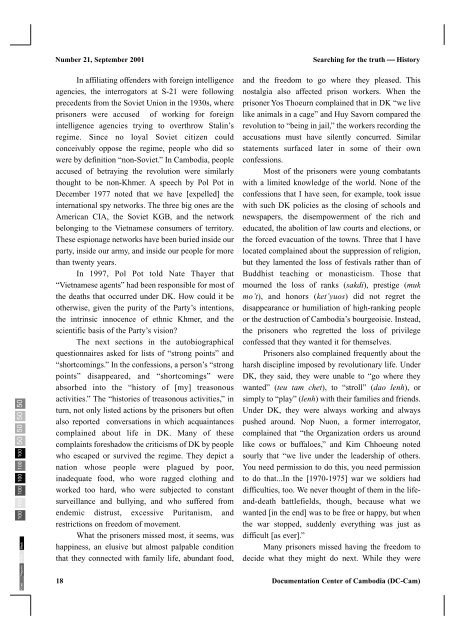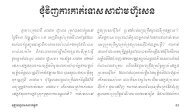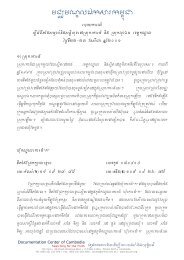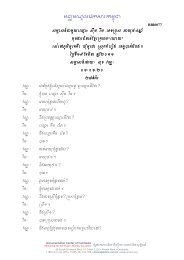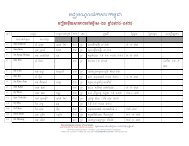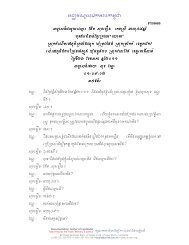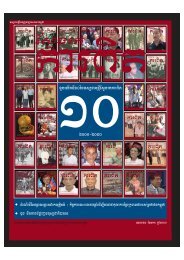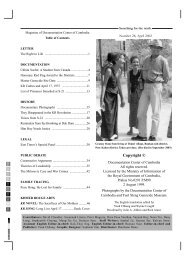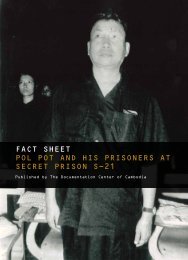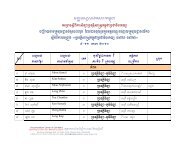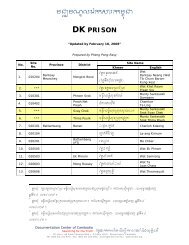Searching for the truth Issues 21 - Documentation Center of Cambodia
Searching for the truth Issues 21 - Documentation Center of Cambodia
Searching for the truth Issues 21 - Documentation Center of Cambodia
You also want an ePaper? Increase the reach of your titles
YUMPU automatically turns print PDFs into web optimized ePapers that Google loves.
100 100 100 100 100 100 50 50 50 50<br />
Black<br />
Yellow<br />
Magenta<br />
Cyan<br />
Number <strong>21</strong>, September 2001<br />
In affiliating <strong>of</strong>fenders with <strong>for</strong>eign intelligence<br />
agencies, <strong>the</strong> interrogators at S-<strong>21</strong> were following<br />
precedents from <strong>the</strong> Soviet Union in <strong>the</strong> 1930s, where<br />
prisoners were accused <strong>of</strong> working <strong>for</strong> <strong>for</strong>eign<br />
intelligence agencies trying to overthrow Stalin’s<br />
regime. Since no loyal Soviet citizen could<br />
conceivably oppose <strong>the</strong> regime, people who did so<br />
were by definition “non-Soviet.” In <strong>Cambodia</strong>, people<br />
accused <strong>of</strong> betraying <strong>the</strong> revolution were similarly<br />
thought to be non-Khmer. A speech by Pol Pot in<br />
December 1977 noted that we have [expelled] <strong>the</strong><br />
international spy networks. The three big ones are <strong>the</strong><br />
American CIA, <strong>the</strong> Soviet KGB, and <strong>the</strong> network<br />
belonging to <strong>the</strong> Vietnamese consumers <strong>of</strong> territory.<br />
These espionage networks have been buried inside our<br />
party, inside our army, and inside our people <strong>for</strong> more<br />
than twenty years.<br />
In 1997, Pol Pot told Nate Thayer that<br />
“Vietnamese agents” had been responsible <strong>for</strong> most <strong>of</strong><br />
<strong>the</strong> deaths that occurred under DK. How could it be<br />
o<strong>the</strong>rwise, given <strong>the</strong> purity <strong>of</strong> <strong>the</strong> Party’s intentions,<br />
<strong>the</strong> intrinsic innocence <strong>of</strong> ethnic Khmer, and <strong>the</strong><br />
scientific basis <strong>of</strong> <strong>the</strong> Party’s vision?<br />
The next sections in <strong>the</strong> autobiographical<br />
questionnaires asked <strong>for</strong> lists <strong>of</strong> “strong points” and<br />
“shortcomings.” In <strong>the</strong> confessions, a person’s “strong<br />
points” disappeared, and “shortcomings” were<br />
absorbed into <strong>the</strong> “history <strong>of</strong> [my] treasonous<br />
activities.” The “histories <strong>of</strong> treasonous activities,” in<br />
turn, not only listed actions by <strong>the</strong> prisoners but <strong>of</strong>ten<br />
also reported conversations in which acquaintances<br />
complained about life in DK. Many <strong>of</strong> <strong>the</strong>se<br />
complaints <strong>for</strong>eshadow <strong>the</strong> criticisms <strong>of</strong> DK by people<br />
who escaped or survived <strong>the</strong> regime. They depict a<br />
nation whose people were plagued by poor,<br />
inadequate food, who wore ragged clothing and<br />
worked too hard, who were subjected to constant<br />
surveillance and bullying, and who suffered from<br />
endemic distrust, excessive Puritanism, and<br />
restrictions on freedom <strong>of</strong> movement.<br />
What <strong>the</strong> prisoners missed most, it seems, was<br />
happiness, an elusive but almost palpable condition<br />
that <strong>the</strong>y connected with family life, abundant food,<br />
18<br />
<strong>Searching</strong> <strong>for</strong> <strong>the</strong> <strong>truth</strong> ⎯ History<br />
and <strong>the</strong> freedom to go where <strong>the</strong>y pleased. This<br />
nostalgia also affected prison workers. When <strong>the</strong><br />
prisoner Yos Thoeurn complained that in DK “we live<br />
like animals in a cage” and Huy Savorn compared <strong>the</strong><br />
revolution to “being in jail,” <strong>the</strong> workers recording <strong>the</strong><br />
accusations must have silently concurred. Similar<br />
statements surfaced later in some <strong>of</strong> <strong>the</strong>ir own<br />
confessions.<br />
Most <strong>of</strong> <strong>the</strong> prisoners were young combatants<br />
with a limited knowledge <strong>of</strong> <strong>the</strong> world. None <strong>of</strong> <strong>the</strong><br />
confessions that I have seen, <strong>for</strong> example, took issue<br />
with such DK policies as <strong>the</strong> closing <strong>of</strong> schools and<br />
newspapers, <strong>the</strong> disempowerment <strong>of</strong> <strong>the</strong> rich and<br />
educated, <strong>the</strong> abolition <strong>of</strong> law courts and elections, or<br />
<strong>the</strong> <strong>for</strong>ced evacuation <strong>of</strong> <strong>the</strong> towns. Three that I have<br />
located complained about <strong>the</strong> suppression <strong>of</strong> religion,<br />
but <strong>the</strong>y lamented <strong>the</strong> loss <strong>of</strong> festivals ra<strong>the</strong>r than <strong>of</strong><br />
Buddhist teaching or monasticism. Those that<br />
mourned <strong>the</strong> loss <strong>of</strong> ranks (sakdi), prestige (muk<br />
mo’t), and honors (ket’yuos) did not regret <strong>the</strong><br />
disappearance or humiliation <strong>of</strong> high-ranking people<br />
or <strong>the</strong> destruction <strong>of</strong> <strong>Cambodia</strong>’s bourgeoisie. Instead,<br />
<strong>the</strong> prisoners who regretted <strong>the</strong> loss <strong>of</strong> privilege<br />
confessed that <strong>the</strong>y wanted it <strong>for</strong> <strong>the</strong>mselves.<br />
Prisoners also complained frequently about <strong>the</strong><br />
harsh discipline imposed by revolutionary life. Under<br />
DK, <strong>the</strong>y said, <strong>the</strong>y were unable to “go where <strong>the</strong>y<br />
wanted” (teu tam chet), to “stroll” (dao lenh), or<br />
simply to “play” (lenh) with <strong>the</strong>ir families and friends.<br />
Under DK, <strong>the</strong>y were always working and always<br />
pushed around. Nop Nuon, a <strong>for</strong>mer interrogator,<br />
complained that “<strong>the</strong> Organization orders us around<br />
like cows or buffaloes,” and Kim Chhoeung noted<br />
sourly that “we live under <strong>the</strong> leadership <strong>of</strong> o<strong>the</strong>rs.<br />
You need permission to do this, you need permission<br />
to do that...In <strong>the</strong> [1970-1975] war we soldiers had<br />
difficulties, too. We never thought <strong>of</strong> <strong>the</strong>m in <strong>the</strong> lifeand-death<br />
battlefields, though, because what we<br />
wanted [in <strong>the</strong> end] was to be free or happy, but when<br />
<strong>the</strong> war stopped, suddenly everything was just as<br />
difficult [as ever].”<br />
Many prisoners missed having <strong>the</strong> freedom to<br />
decide what <strong>the</strong>y might do next. While <strong>the</strong>y were<br />
<strong>Documentation</strong> <strong>Center</strong> <strong>of</strong> <strong>Cambodia</strong> (DC-Cam)


